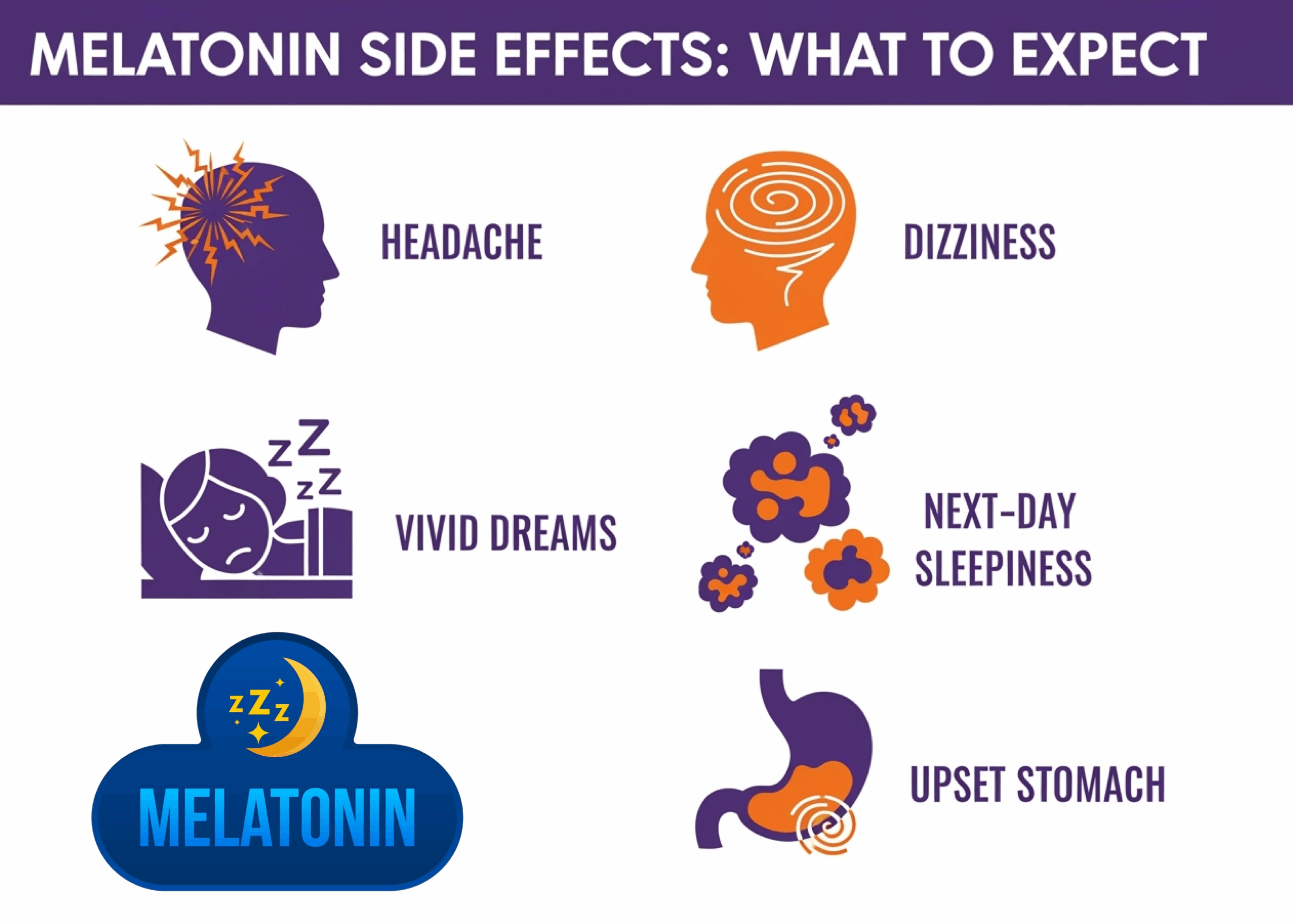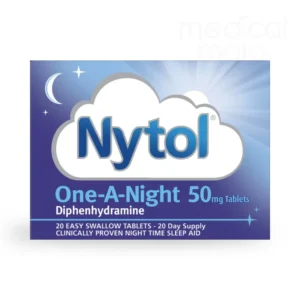Melatonin isn’t just a “sleep hormone”—it’s your body’s natural timekeeper, a jet lag fixer, and a surprising player in everything from mood to fertility. In this guide, we’ll explore what melatonin is, how it works, why you need it, and how to use it safely (especially in the UK).
Table of contents
- Five key takeaways:
- What is melatonin?
- Melatonin and the circadian rhythm
- Who needs to know about melatonin?
- How does melatonin work?
- The Dracula hormone
- Why is melatonin important?
- How does melatonin control sleep?
- Zeitgebers: How your body clock sets itself
- The pineal gland and the suprachiasmatic nucleus (SCN)
- How does melatonin actually work in the body?
- Light, screens, and melatonin: Why blue light matters
- Melatonin and jet lag
- Shift work
- Melatonin and sleep disorders
- Is melatonin legal in the UK?
- How do you take melatonin?
- How long does melatonin take to work?
- How can you get melatonin to work faster?
- Is it safe to take melatonin every night?
- What are the side effects of melatonin?
- Melatonin and fertility
- Melatonin and testosterone
- What about shift work?
- Melatonin and children
- Myths and facts
- FAQs
- References:
-
 Circadin 2mg Prolonged Release TabletPrice range: £24.99 through £45.99
Circadin 2mg Prolonged Release TabletPrice range: £24.99 through £45.99 -
 Phenergan Elixir£12.99
Phenergan Elixir£12.99 -
 Phenergan 25mg tablets£19.99
Phenergan 25mg tablets£19.99
Five key takeaways:
- Melatonin is a hormone produced by your brain to help you fall asleep and keep your body clock on track [1], [2].
- Light—especially blue light—controls when your body makes melatonin, so scrolling late at night really does mess with your sleep [3], [4].
- In the UK, melatonin is prescription-only and not available as an over-the-counter supplement [5].
- Melatonin can help with jet lag, shift work, and certain sleep problems, but it’s not a miracle cure for everyone [1], [6].
- There are different ways to take melatonin (including oral patches), and how you use it really matters for best results [7].

What is melatonin?
Melatonin is a hormone made by the pineal gland, a tiny, pine-cone-shaped part of your brain. Its main job is to signal to your body that it’s time to wind down and get some rest. Think of it as your internal “sleep whisperer” [1].
The levels of melatonin start to rise in the evening, stay high during the night, and drop in the morning, helping you feel sleepy at bedtime and awake in the morning [2].
Melatonin and the circadian rhythm
Melatonin doesn’t just help you sleep—it also helps keep your body clock (circadian rhythm) in sync with the world around you, which is why it’s so essential for people who travel across time zones or work night shifts [3].

Who needs to know about melatonin?
Anyone struggling with sleep, jet lag, or shift work—or just curious about how their body clock works—can benefit from understanding melatonin.

How does melatonin work?
Melatonin acts like a messenger, telling your brain and body when it’s time to rest and recover. It is a hormone that acts as your body’s natural sleep signal.
As the evening approaches and daylight fades, your brain’s pineal gland starts to release more melatonin into your bloodstream [1], [2], [3].
These rising levels make you feel drowsy and help prepare your body for sleep. Melatonin stays high throughout the night, keeping you in a restful state, and then drops sharply in the early morning, helping you wake up and feel alert for the day ahead [1], [3].
The Dracula hormone
This process is tightly linked to light exposure. Melatonin is often nicknamed the “Dracula hormone” because it only comes out in the dark!
When your eyes detect darkness, your brain gets the message to start making melatonin. But if you’re exposed to bright light—especially blue light from phones, tablets, or computers—your brain gets confused and holds off on melatonin production. That’s why using screens late at night can make it much harder to fall asleep [1], [2], [3].
In short, melatonin helps set your internal clock, telling your body when it’s time to rest and when it’s time to rise.

Why is melatonin important?
Without melatonin, your sleep-wake cycle can get out of sync, making you groggy, moody, or even unwell [1], [2], [3], [4].

How does melatonin control sleep?
Getting a good night’s sleep isn’t just about “feeling tired.” It’s about two things working together: your body clock (circadian rhythm) and your “sleep pressure” (how long you’ve been awake) [3].
Melatonin is the primary hormone that controls your body clock. When the sun sets, your brain starts releasing melatonin, nudging you towards sleep. If you’re exposed to bright light or blue light from screens, your brain thinks it’s still daytime and holds off on making melatonin [4].
Real-world tip:
Try switching off screens an hour before bed, or use a blue light filter to help your body make melatonin naturally [3], [4].

Zeitgebers: How your body clock sets itself
Your body clock isn’t set in stone—it’s constantly being adjusted by “zeitgebers” (German for “time givers”). These are things like light, meals, exercise, and temperature that help reset your internal clock [3].
Light is the most powerful zeitgeber, which is why getting outside during the day (and keeping things dark at night) is so essential for healthy sleep [3].
Practical tip:
If you’re struggling with jet lag or shift work, try to get natural sunlight during the day and keep your bedroom as dark as possible at night [3].

The pineal gland and the suprachiasmatic nucleus (SCN)
The pineal gland makes melatonin, but it listens to instructions from the suprachiasmatic nucleus (SCN)—your brain’s “master clock.”
The SCN gets signals from your eyes about light and dark, then tells the pineal gland when to start or stop making melatonin [2], [3].
Fun fact:
Philosopher René Descartes once called the pineal gland the “seat of the soul.” While we now know that’s a bit of a stretch, it’s definitely the seat of your sleep [2], [3]!

How does melatonin actually work in the body?
For most people, melatonin levels start to rise in the early evening, stay high overnight, and fall a few hours before you wake up. This gentle rise and fall helps you drift into sleep and wake up feeling refreshed [2].
Melatonin doesn’t just work in your brain—it has receptors in your gut, heart, skin, and even your reproductive organs [7], [8].
Real-world example:
If you’ve ever felt sleepy as soon as it gets dark on a winter afternoon, that’s melatonin at work [2], [7], [8]!

Light, screens, and melatonin: Why blue light matters
The light you’re exposed to has a huge effect on melatonin. Blue light from phones, tablets, and laptops can trick your brain into thinking it’s still daytime, which stops melatonin production and makes it harder to fall asleep [4].
That’s why experts recommend putting screens away before bed or using blue light filters [4].
Practical tip:
Try “night mode” on your devices, or invest in blue light-blocking glasses for evening use [4].

Melatonin and jet lag
Jet lag happens when your body clock is out of sync with the local time, usually after a long flight across time zones. Melatonin can help reset your clock, especially if you take it at the right time (usually in the evening at your destination) [3].
But timing is everything: take melatonin too early or too late, and you might make things worse.
Pro tip:
Check with a pharmacist or sleep specialist before using melatonin for jet lag. The right timing is key [3]!

Shift work
For people who work nights or rotating shifts, melatonin can be a lifesaver. Taking it at the right time can help shift your body clock and make it easier to sleep during the day [3].
But again, timing and dose matter—a lot.
Real-world insight:
Some shift workers use blackout curtains, eye masks, and melatonin together for best results [3]!

Melatonin and sleep disorders
Melatonin isn’t just for jet lag and shift work. It’s also used (by prescription) to help with certain sleep disorders, especially in older adults and in some children [5].
In the UK, melatonin can be prescribed for:
- Jet lag
- Short-term insomnia in adults over 55
- Some sleep disorders in children (on specialist advice) [6]

Is melatonin legal in the UK?
In the UK, melatonin is a prescription-only medicine. You can’t buy it over the counter or as a supplement, unlike in the US [5].
If you see melatonin gummies or tablets for sale in health food shops or online, they’re not legal in the UK [5].
Who can prescribe it?
Only a doctor or qualified prescriber can prescribe melatonin in the UK.
Where can you get it?
From a registered pharmacy, after a consultation with a prescriber (including online services like courierpharmacy.co.uk) [5].

How do you take melatonin?
Melatonin comes in different forms:
- Tablets and capsules
- Oral patches or films that dissolve in your mouth (these can work faster) [7]
- Liquid drops (less common)
How you take melatonin can affect how quickly it works and how you feel. Oral patches, for example, can help you fall asleep faster and may cause fewer side effects [7].
Pro tip:
Always follow your prescriber’s advice on dose and timing for best results [7].

How long does melatonin take to work?
Melatonin usually takes about 30 minutes to an hour to start working, but this can vary depending on the form and your own body chemistry [7].
Pro tip:
Take melatonin about 30–60 minutes before you want to fall asleep for best results. For faster results, try the compounded oral patches from Courier Pharmacy [7].

How can you get melatonin to work faster?
You can get melatonin to work faster by using a buccal film, which is a thin strip that dissolves inside your cheek or under your tongue.
Unlike traditional tablets that must travel through your stomach, intestines, and liver before reaching your bloodstream, the buccal film allows melatonin to be absorbed directly through the lining of your mouth.
This direct route means melatonin enters your bloodstream much quicker, helping you feel its effects sooner—perfect if you want to fall asleep faster or need rapid action for jet lag or shift work.

Is it safe to take melatonin every night?
Melatonin is generally safe for short-term use, but long-term safety isn’t fully known. Most people don’t have side effects, but some experience headaches, dizziness, or vivid dreams [9].
Always talk to your doctor or pharmacist before starting melatonin, especially if you have other health conditions or take different medicines [9].

What are the side effects of melatonin?
Most people tolerate melatonin well, but possible side effects include:
- Headaches
- Dizziness
- Nausea
- Sleepiness the next day
- Vivid dreams or nightmares
If you notice any worrying symptoms, stop taking melatonin and speak to a healthcare professional [9].

Melatonin and fertility
Melatonin is involved in the reproductive system and may have a role in fertility, though more research is needed. Some studies suggest it may help with certain infertility problems, but don’t take melatonin for this purpose without medical advice [10].

Melatonin and testosterone
Melatonin interacts with hormones in the body, including testosterone. There’s some evidence that it can influence testosterone levels, but the effects are still being studied [11].
What about shift work?
Some research suggests that working night shifts (and disrupting melatonin production) may be linked to a higher risk of certain cancers [12]. This is an area of ongoing research, but it’s another reason to take care of your sleep and light exposure [12].

Melatonin and children
Melatonin can be prescribed for children with certain sleep disorders, but only on specialist advice. Never give melatonin to a child without consulting a healthcare professional first [5].

Myths and facts
Myth: Melatonin is a sleeping pill.
Fact: Melatonin helps signal to your body that it’s time to sleep, but it won’t “knock you out” like a sleeping tablet.
Myth: More melatonin means better sleep.
Fact: Too much melatonin can actually disrupt your sleep or cause side effects. The correct dose is key.
Myth: Melatonin is safe for everyone.
Fact: Melatonin is generally safe, but it’s not right for everyone. Always check with a healthcare professional.
-
 Circadin 2mg Prolonged Release TabletPrice range: £24.99 through £45.99
Circadin 2mg Prolonged Release TabletPrice range: £24.99 through £45.99 -
 Nytol One-A-Night tabletsPrice range: £6.49 through £13.29
Nytol One-A-Night tabletsPrice range: £6.49 through £13.29 -
 Phenergan Elixir£12.99
Phenergan Elixir£12.99
FAQs
What is melatonin?
Melatonin is a hormone made by your brain to help regulate your sleep-wake cycle [1].
Can I buy melatonin in the UK?
No, it is prescription-only in the UK. You can’t buy it over the counter or as a supplement [5]. You can buy melatonin in the UK from Courier Pharmacy after completing the online health questionnaire.
How do I take melatonin?
Follow your prescriber’s advice. Usually, you take it 30–60 minutes before you want to sleep [7]. For faster results in as little as 15 minutes, try the compounded oral melatonin patch, available from Courier Pharmacy. This compounded melatonin oral patch can only be purchased after completing an online health questionnaire.
Is melatonin safe?
Melatonin is generally safe for short-term use, but always check with a healthcare professional [9].
Does melatonin help with jet lag?
Yes, it can help reset your body clock after long flights, but timing is key. Ask your pharmacist for advice [3].
Can children take melatonin?
Only under specialist advice and prescription [5].

This information is for general guidance only. For medical advice, please consult your doctor or healthcare provider.
References:
- [1] Medical Mojo (n.d.) What is melatonin? Available at: https://medicalmojo.co.uk/what-is-melatonin/ (Accessed: 6 August 2025).
- [2] Arendt J. Melatonin and the Mammalian Pineal Gland. Chapman & Hill; London: 2005.
- 3] Cajochen C, Krauchi K, Wirz-Justice A. Role of melatonin in the regulation of human circadian rhythms and sleep. J Neuroendocrinol. 2003;15:432–437.
- [4] Kalsbeek A, Garidou ML, Palm IF, Van Der Vliet J, Simonneaux V, Pevet P, Buijs RM. Melatonin sees the light: blocking GABA-ergic transmission in the paraventricular nucleus induces daytime melatonin secretion. Eur J Neurosci. 2000;12:3146 3154.
- [5] Courier Pharmacy (n.d.) Why is melatonin banned in the UK? Available at: https://courierpharmacy.co.uk/why-is-melatonin-banned-in-the-uk-2/ (Accessed: 6 August 2025).
- [6] Courier Pharmacy (n.d.) Is it safe to take melatonin every night? Available at: https://courierpharmacy.co.uk/is-it-safe-to-take-melatonin-every-night/ (Accessed: 6 August 2025).
- [7] Courier Pharmacy (n.d.) How long does melatonin take to work? Available at: https://courierpharmacy.co.uk/how-long-does-melatonin-take-to-work/ (Accessed: 6 August 2025).
- [8] Medical Mojo (n.d.) What is sleep? Available at: https://medicalmojo.co.uk/what-is-sleep/ (Accessed: 6 August 2025).
- [9] Courier Pharmacy (n.d.) Melatonin side effects. Available at: https://courierpharmacy.co.uk/melatonin-side-effects/ (Accessed: 6 August 2025).
- [10] Medical Mojo (n.d.) Melatonin and infertility. Available at: https://medicalmojo.co.uk/melatonin-and-infertility/ (Accessed: 6 August 2025).
- [11] Medical Mojo (n.d.) Melatonin and testosterone: Is there a connection? Available at: https://medicalmojo.co.uk/melatonin-and-testosterone-is-there-a-connection/ (Accessed: 6 August 2025).
- [12] Medical Mojo (n.d.) Working night shifts and the links to cancer. Available at: https://medicalmojo.co.uk/working-night-shifts-and-the-links-to-cancer/ (Accessed: 6 August 2025).



